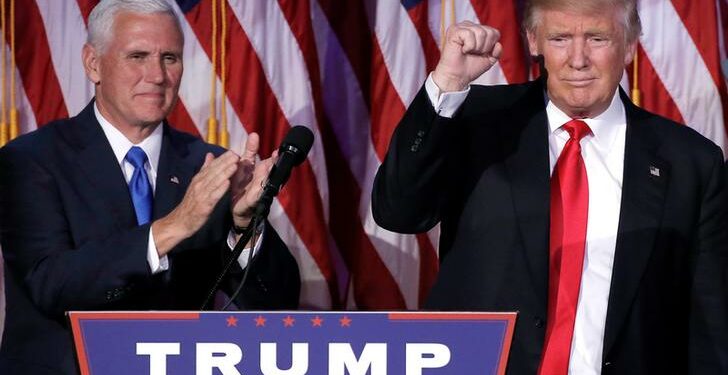RANGOON — Members of Burma’s business community have been reluctant to speculate about changes to the country’s economic relationship with the US after news broke of Donald Trump’s victory in presidential elections this week.
In Burma, mixed opinions and predictions followed Wednesday’s electoral results from the US, in which business mogul and Republican candidate Donald Trump claimed victory over former Secretary of State Hillary Clinton, of the Democratic Party.
“This election result shows that nationalist influence around the world is getting stronger. However Trump is looking out for [American] national interests, we will have to welcome him,” U Thein Tun, chairman of the Tun Foundation Bank, told The Irrawaddy. Yet he added that, “it is still too early to comment for the future.”
Current US President Barack Obama lifted economic sanctions on Burma in October, and Burmese businessmen on the Specially Designated Nationals list saw their names removed, including U Tay Za, U Khin Shwe, U Htay Myint, U Zaw Zaw and Stephen Law (also known as Tun Myint Naing).
The announcement of the changes was made during State Counselor Daw Aung San Suu Kyi’s visit to the US in September.
Since then, US business delegations have visited the country to discuss opportunities for future business cooperation. Insiders report that although they had developed a positive relationship with the US under Obama, there are concerns for Trump’s upcoming term.
“It would have been no problem if Hillary had won because her and Obama’s approaches to Myanmar would have been the same. We believe that the US-Myanmar business relationship will have stronger ties, but we don’t know what Trump’s plans and interests are,” U Myat Thin Aung, chairman of Hlaing Tharyar Industrial Zone, said.
“I don’t think his interest in Myanmar is strong, but sanctions will not be imposed again here. He is a businessman—he will support business,” he said of Trump, adding, “but let’s wait and see.”
Echoing U Myat Thin Aung’s reservations, Dr. Maung Maung Lay, vice president of the Union of Myanmar Federation of Chambers of Commerce and Industry (UMFCCI) speculated that it would take at least one year to determine Trump’s interests and course of action in Asia, and in Burma in particular.
“We’ve been working well with the US business delegations and policies under Obama’s administration and now we need to reconstruct that relationship under Trump’s administration,” he said.
US business delegations are still scheduled to come to Burma to meet with UMFCCI officials and private sector members before Obama transfers power to Trump in January. Another 15 delegates will meet with UMFCCI officials on Nov. 15 to discuss future cooperation.
“The thing is, US investment in Myanmar is not as big as other countries. They are providing moral rather than material support, so let’s wait and see,” said U Maung Maung Lay.
U Khin Shwe, chairman of the Zaykabar Group of Companies and former Upper House lawmaker, told The Irrawaddy that he welcomed Donald Trump’s victory and held the view that Trump’s background as a businessman indicated that the United States’ economic relationship with Burma could grow during his term in office.
“He would be decisive with business development if he has a relationship with Myanmar, so more US businessmen will come. I am optimistic about that,” he said.

















